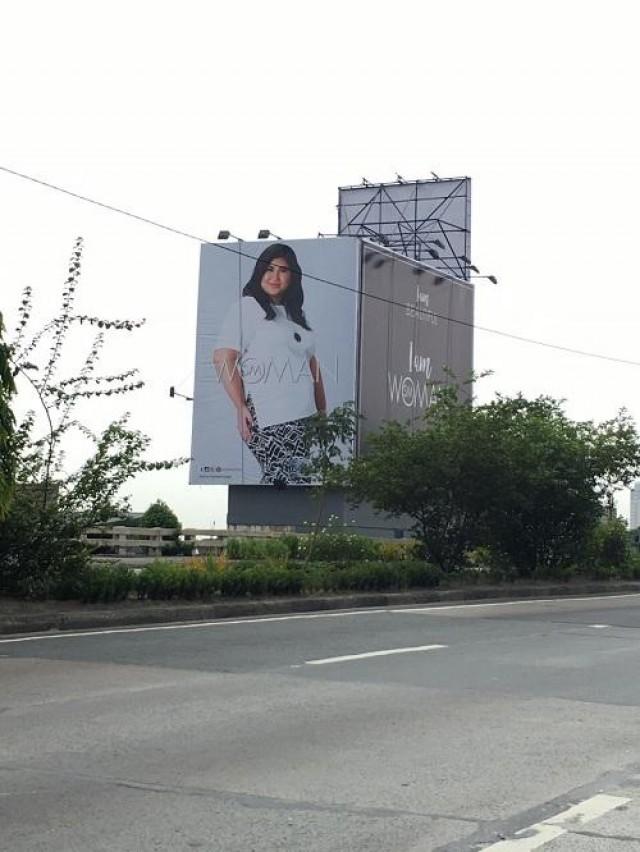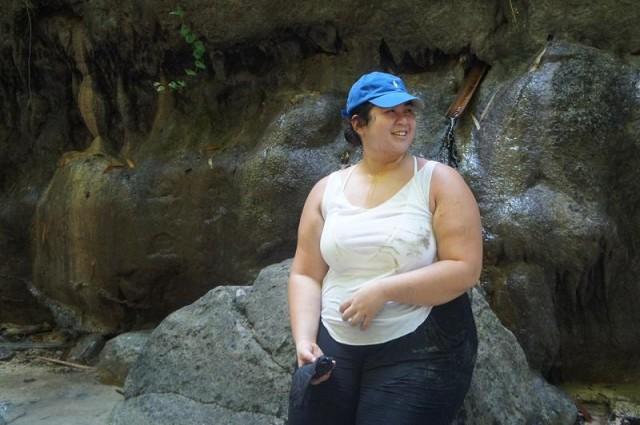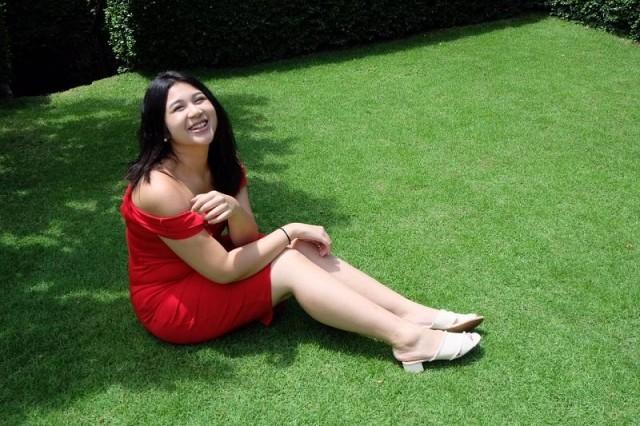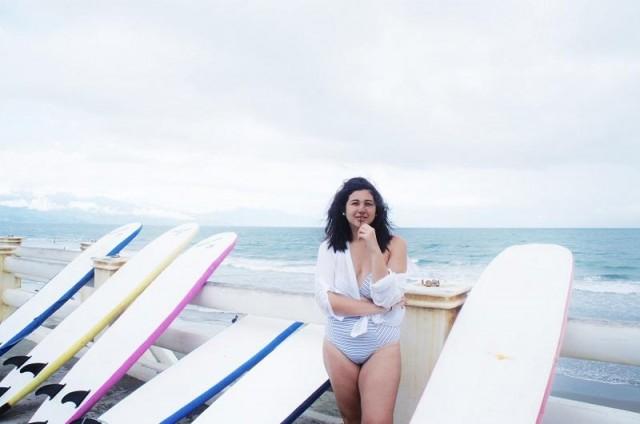I lost more than 100 lbs in nine months
Drea Aldeguer is a 22-year-old Cebuana influencer who gained a following for confidently loving and accepting her "plus-sized" body. And then she was diagnosed borderline diabetic, forcing her to rethink of ways to love her body. Last year, she finally gave in to having bariatic surgery, and here, she tells us her story.

I’ve always been a “big girl" since the day I was born; I was a 9lb 9oz infant, you see.
Growing up, I struggled with my weight and that struggle made me shy. I dreaded PE classes in grade school, knowing I couldn’t move as fast as my “normal-weight” classmates. Until now, the thought of PE still scares me.
But when I was around 13 years old, I was able to turn my secret love for fashion into a form of self-expression. It helped me come out of my shell. I guess this translated to self-confidence because regardless of my size, I wore whatever I wanted.
Back then, being a confident, plus-sized woman was rare in the Philippines. This was probably why in my hometown Cebu, I had some sort of a following.
By selling my pre-loved clothes and plus-sized clothes that I designed, I unconsciously jumpstarted a small community of plus-sized women
It was only very recently when this whole body positivity movement gained popularity, thanks to people like Stacy and Danah Gutierrez who ran the website Plump.ph, as well as the international recognition of models like Ashley Graham.

Need a wellness break? Sign up for The Boost!
Stay up-to-date with the latest health and wellness reads.
Please enter a valid email address
Your email is safe with us
In 2015, I personally felt and experienced body positivity enter the mainstream. I had my first two fashion shows that year, with the brand asking me to be an ambassador for their I Am Woman campaign. It was such an empowering experience: I liked that I was inspiring people of all sizes.

But this confidence overshadowed underlying issues I had with my body — issues that went beyond size.
In 2016, I hit my heaviest at 288 pounds! It was my first year in a university in Manila, and since I don’t know how to cook and live on my own, I resorted to binge eating fast food.
I’ve tried every diet you could possibly think of — Cohen, South Beach, Calorie Counting, I’ve tried them all.
My family and I would always discuss ways to help me lose weight, with my parents suggesting weight loss surgery, which I never considered.
I thought that weight loss surgery was a cop out; I could just eat healthier and work it off — which is 100% doable for anyone.
But at 21 years old, I learned that I had stones in my gallbladder. I was diagnosed borderline diabetic. I had to rethink my stance on surgery.

I did my homework, researching about it and its side effects online. I saw and interviewed surgeons who explained the procedure to me. On Instagram, I was surprised to see millions of posts tagged “#bariatic”. I explored the hashtag and found real life people, who have gone through actual surgeries.
And these patients had their own community, too, giving personal advice, sharing their weight loss experiences, covering so many questions that a Google search could not answer. I think that’s what really pushed me to undergo the surgery.
There are a couple of bariatric surgeries available. I consulted with a surgeon, and we decided that a vertical sleeve gastrectomy would be the best method.
Basically, a vertical sleeve gastrectomy is where a big portion of your stomach is removed and you’re left with a banana-sized stomach. With this smaller stomach, you are able to eat less and that’s how you lose the weight gradually.
My doctor suggested we have my gallbladder removed at the same time. We set the date for Sept 7, 2016.
But even before the surgery, I learned that it was not the quick fix I always thought it was. It entailed "real work," which began one week before the surgery. I was put on liquid diet to reduce the fattiness in my liver, so that the surgery can be performed safely. On that liquid diet alone, I lost 11 lbs.
On the morning of the surgery, I weighed in at 277 lbs. I was wheeled into the operating room, was put under general anaesthesia and woke up after 3 hours, with some pain and a little discomfort.
The surgery was done laparoscopically, which gave me little to no pain from the wounds; there were only five tiny incisions.
I didn’t eat or drink anything on the first 24 hours post-surgery. I could barely sit up straight, too.
On the second day, I started walking around the hospital room slowly, helping ease my discomfort. Then I started consuming liquids again, even if I could only do it little by little.
The recovery in the hospital was easy for me. I was discharged 4 days after, and flew back to Manila from Cebu right after.
I was put on liquid diet for two weeks after surgery—I had to be gentle on my stomach.
After those two weeks, I eventually ate soft food like egg and cheese. The first month, I had dropped 30lbs.
As I started introducing meats, vegetables, and other solid food into my diet, my weight loss began to slow down. Losing 15lbs down a month became 10lbs then five then even sometimes zero. Nine months after the surgery, I lost a total of 120lbs.

In those nine months, I’ve learned that weight loss surgery was the farthest thing from just a “quick fix”. I still had to watch what I ate, and I had to learn about portion control.
What this surgery is the most is a tool: a tool that helped me change my lifestyle — and that’s what is more important to me than just “slimming down”.
I think what people don’t understand is that bariatric surgery can only control how much you eat in terms of quantity. It doesn’t change your relationship with food, which is where the real work is.
That was a battle I had to fight on my own. I decided to maximize this blessing given to me by changing the way I looked at food. Instead of seeing it as a past-time or a form of temporary happiness, I conditioned myself to view food as fuel to nourish my body — that’s what helped me keep off the 120lbs I had already lost.
I gradually became more active, exercising until it became a habit. But see, I don’t just look it as part of my routine, I’ve really learned to enjoy it.
Being a college student hardly gives me time to exercise and cook healthy meals every day, so I like to stay on track by doing cardio thrice a week. Every Sunday, I prepare my meals for the whole week just to make sure I don’t turn to fast food again.
I hope to start weight-training soon, or even try out a new sport. It has been a struggle trying to balance this with my studies. But my energy has actually helped me do better in school now. I don’t feel sluggish going to class, my mind is clearer, and my overall confidence boost has just made school life a more pleasant experience.

There’s not much I miss pre-weight loss, although I do joke a lot that I seem to have lost my personal style with the overwhelming amount of clothes that can actually fit me now. Haha!
I miss all the food I allowed myself to eat, but I definitely don’t miss heavily panting after climbing up one flight of stairs or not being able to keep up with my friends while going on a hike.
But it’s also the little things like being able to cross my legs or fitting comfortably on an airplane seat. These are all the little victories I celebrate to help keep me going. They have brought a new kind of confidence that is beyond the satisfaction of wearing whatever clothes I want to wear.
It’s funny because the thing I feared the most about getting this surgery was what people would think.
I feel like it's a little hypocritical, having surgery after being an ambassador in a national campaign on confidence and body.
I just hope people understand that loving your body does not only mean accepting it. It means taking care of it as well — no matter your size. — LA, GMA News

Need a wellness break? Sign up for The Boost!
Stay up-to-date with the latest health and wellness reads.
Please enter a valid email address
Your email is safe with us






